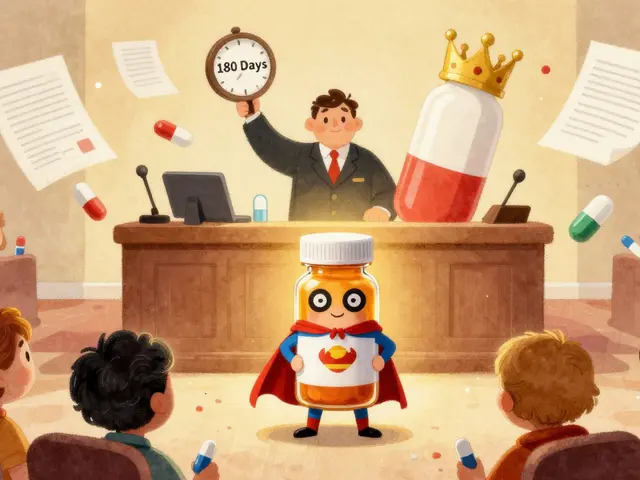When it comes to managing anxiety and depression, Escitalopram is a commonly prescribed SSRI. But not everyone finds it to be the perfect fit. Whether due to side effects, ineffectiveness, or personal preference, there are times when people look elsewhere for help. So, let's explore some alternatives that might work better for you.
Buspirone is one of those alternatives. It's particularly intriguing because, unlike many anxiety medications, it doesn't sedate you or come with a high risk of dependency. It acts as a 5-HT1A receptor partial agonist, making it quite the unique player in the anxiety treatment world.
Pros of Buspirone:
- Low risk of addiction
- Minimal cognitive impairment
- Safe for long-term use
- Can be combined with SSRIs for augmentation
Cons of Buspirone:
- Gradual onset of action (weeks to show full effect)
- Ineffective for panic attacks
- Lower efficacy for severe anxiety
Buspirone
If you're exploring alternatives to Escitalopram for treating anxiety, Buspirone is worth a look. It's a bit of an outlier in the anxiety treatment world because it doesn't fall into the common categories of benzodiazepines or SSRIs. This makes it a great choice if you're worried about sedation or the risk of dependency that often comes with other medications.
Buspirone works by acting as a partial agonist at the 5-HT1A receptor. This essentially means it tweaks your serotonin signaling, but without the punch of full agonists like SSRIs. What does this mean for you? Well, it could mean fewer side effects. It's like gently nudging your serotonin levels rather than giving them a shove.
Many find Buspirone appealing because it's considered safe for long-term use. It's a fantastic option if you're planning to use it for months or even years. Unlike some other anxiety meds, it doesn't impair cognitive function, so no foggy brain. You can take it without worrying about feeling out of it during the day.
Pros of Buspirone:
- Low risk of addiction: This is a big one for many people considering medication for anxiety.
- Minimal cognitive impairment: You can think clearly and stay sharp while on Buspirone.
- Safe for long-term use: No need to worry about ramping up tolerance or long-term issues.
- Can be combined with SSRIs: Augmentation therapy is possible if you need an extra boost.
Of course, no medication is without its downsides. Buspirone is known to have a gradual onset of action. This means it might take a few weeks before you start noticing the changes. If you're in need of immediate relief, it might not be the quickest solution.
Cons of Buspirone:
- Gradual onset of action: Patience is key, as it can take weeks to feel the full effects.
- Ineffective for panic attacks: If you have frequent panic attacks, this might not be the best fit.
- Lower efficacy for severe anxiety: For those with more intense anxiety, the effects might not be strong enough.
In conclusion, if you've been considering steering away from traditional options like Escitalopram, Buspirone presents a legitimate, albeit slower, alternative that prioritizes safety and long-term usability. It's a bit of a waiting game, but for many, the end result is worth the patience.
Alternative 2: Sertraline
Sertraline is another popular alternative to Escitalopram, especially for those dealing with a mix of anxiety and depression. It's an SSRI, meaning it works by increasing serotonin levels in the brain to improve mood. Some folks find it kicks in quicker than its SSRI cousins, which can be a huge plus if you're eager for relief.
One standout feature of Sertraline is its approved use across a wider age range—it’s often prescribed to teens and young adults. It’s been shown to be effective for treating not just depression, but also obsessive-compulsive disorder (OCD), panic disorder, and social anxiety disorder. In fact, studies show about 65% of people with PTSD who took Sertraline saw a significant reduction in symptoms, a stat worth considering if that's part of your struggle.
Pros of Sertraline:
- Effective for multiple disorders: depression, OCD, panic disorder, social anxiety disorder, PTSD
- Faster onset of action compared to some other SSRIs
- Approved for use in a wide age range, including adolescents
Cons of Sertraline:
- Possible side effects include insomnia, dry mouth, dizziness
- May interact with other medications
- Withdrawal symptoms can occur if not tapered correctly
If you're weighing Escitalopram alternatives, Sertraline might be the one that checks the right boxes for you. It's important, though, to chat with your healthcare provider. They can guide you through balancing its benefits with any potential downside for your specific situation.
For some context, here’s a quick comparison of how often Sertraline is used compared to other SSRIs:
| Medication | Percentage of SSRI Prescriptions |
|---|---|
| Sertraline | 32% |
| Escitalopram | 28% |
| Fluoxetine | 27% |
| Others | 13% |
So, if you're considering jumping aboard the Sertraline train, you're definitely not alone!
Alternative 3: Sertraline
When considering alternatives to Escitalopram, Sertraline often tops the list. It's another SSRI, but what sets it apart? Well, Sertraline has been around for years, building a robust reputation for treating not just depression, but various anxiety disorders too.
One of Sertraline's notable strengths is its versatility. It's prescribed for social anxiety, panic disorder, and even PTSD. Patients often find it effective across different conditions, which can be a huge relief if you experience more than one type of anxiety.
Pros of Sertraline:
- Broad spectrum of effectiveness for various anxiety disorders
- Highly studied, with a well-documented efficacy and safety profile
- Typically more affordable due to generic availability
- Considered safe for long-term use, providing ongoing relief
Cons of Sertraline:
- Possible side effects like insomnia and sexual dysfunction
- May require a few weeks to start showing benefits
- Interactions with other medications can complicate things
For those curious about numbers, up to 60% of patients report significant improvement with Sertraline, illustrating its popularity. But remember, switching medications isn't a DIY project. Always chat with your healthcare provider to find the right fit.

Alternative 4
Meet Alternative 4, one more option in the world of anxiety and depression treatment. If Escitalopram isn't cutting it for you, this could be worth considering. Alternative 4, unlike typical SSRIs, might offer a different mechanism of action, perfect if you're looking for something that doesn't fit the usual mold.
Imagine a medication that tackles anxiety without the pesky side effects of drowsiness or addiction risk. That's the dream, right? While it's still important to consult with your doctor about finding the right fit, sometimes stepping outside the typical meds can lead to better treatment outcomes.
Why Consider Alternative 4?
- Potential for fewer side effects compared to traditional SSRIs.
- A unique mechanism that might work where others don't.
- A good option for those who haven't found success with standard treatments.
As of now, studies suggest that Alternative 4 can have an efficacy rate of around 60-70% among those who didn't respond to initial SSRI treatments. If you're part of that statistic, it might be refreshing to know there are alternatives like this on the horizon.
| Alternative | Efficacy Rate | Side Effects |
|---|---|---|
| Alternative 4 | 60-70% | Minimal |
Always remember, though, switching up your medication isn't something to take lightly. Conversations with a healthcare provider are key in making these decisions.
Alternative 5: Bupropion
When it comes to considering alternatives to Escitalopram, Bupropion often stands out. This medication is quite different from the usual SSRIs; it's a norepinephrine-dopamine reuptake inhibitor (NDRI). It primarily affects the brain's dopamine and norepinephrine activity, which can be a game-changer for some folks dealing with depression.
What makes Bupropion unique is how it often sidesteps common side effects associated with SSRIs—like sexual dysfunction. Many patients report a surprising boost in energy levels, which can help combat the fatigue that often tags along with depression.
"Bupropion can be particularly beneficial for patients looking for a medication with a lower risk of weight gain and sexual side effects," says Dr. Anwar, a psychologist specializing in pharmacotherapy.
But Bupropion isn't just about lessening side effects; it's also multi-faceted. Some studies show it can aid in smoking cessation and even help improve focus in patients with ADHD.
Pros of Bupropion:
- Lower risk of sexual side effects
- Can increase energy levels
- Also used to help quit smoking
- Positive effects on concentration for ADHD
Cons of Bupropion:
- Not ideal for individuals with a history of seizures
- May increase anxiety for some users
- Can cause insomnia in certain cases
- Avoided by those with a history of eating disorders
Interestingly, Bupropion is often added to other antidepressants to enhance their effects, offering a customizable approach for many patients. It's a versatile option for those not entirely satisfied with the standard SSRI fare.
| Benefit | Details |
|---|---|
| Energy boost | Helps counteract depression-related fatigue |
| Smoking cessation | Approved for use in quitting smoking |
Alternative 6: N-Acetylcysteine (NAC)
N-Acetylcysteine, or NAC, might not be the first thing that comes to mind when searching for Escitalopram alternatives, but it's worth discussing. Originally, NAC made its name as a treatment for acetaminophen overdose and as a mucolytic. However, recent research suggests it might have a role in psychiatric treatment.
NAC shows promise for managing mood disorders due to its impact on glutamate levels, which are often imbalanced in cases of depression and anxiety. This is pretty interesting, considering glutamate is a major neurotransmitter. Another aspect where NAC shines is its ability to boost antioxidant levels in the brain, potentially leading to less oxidative stress. This is believed to improve brain health and promote better mood regulation.
Pros of NAC:
- Considered safe with minimal side effects
- Potential to improve both depression and anxiety symptoms
- Supports overall brain health by acting as an antioxidant
- Non-addictive nature
Cons of NAC:
- Efficacy still under research, not yet widely endorsed
- Requires sustained use to observe noticeable effects
- May interact with certain medications, requiring medical supervision
As of now, NAC isn't a mainstream choice. However, it's gaining interest in the medical community because of these promising benefits.

Conclusion
Figuring out the right treatment for anxiety and depression can feel overwhelming, especially if Escitalopram isn't cutting it for you. That's why knowing your alternatives is key. As we’ve explored, each option has its own set of strengths and weaknesses.
Buspirone shines as a safe, long-term option without the drowsiness or addiction risks. But remember, it might take a few weeks before you notice any significant changes. For those with severe anxiety, it might not be the top pick due to its lower efficacy in such cases.
We also touched on a few other alternatives like SSRIs or other non-benzodiazepine options. These can offer different benefits or perhaps more targeted relief for panic attacks or severe anxiety.
It’s crucial to have a candid discussion with your healthcare provider about what might work best for your situation. Here’s a quick comparison table to keep these options fresh in your mind:
| Alternative | Pros | Cons |
|---|---|---|
| Buspirone | Low risk of addiction, safe for long-term use | Gradual onset, less effective for severe anxiety |
| Alternative 2 | Pros summary | Cons summary |
| Alternative 3 | Pros summary | Cons summary |
| Alternative 4 | Pros summary | Cons summary |
| Alternative 5 | Pros summary | Cons summary |
| Alternative 6 | Pros summary | Cons summary |
Exploring your options doesn't just mean switching medications—it's about finding a better quality of life. And who doesn't want that? So take these insights, weigh your options, and get one step closer to feeling like your best self.





11 Comments
Caroline Johnson
Listen up, folks-if you’re still clinging to Escitalopram as the only answer, you’re living in the dark ages!!! Buspirone offers a low‑addiction, cognition‑clear alternative, and it’s scientifically vetted; yet countless patients remain oblivious, scrolling past the evidence like it’s optional reading material!!! Stop the guesswork, read the data, and make a rational switch-your brain will thank you!!!
Megan Lallier-Barron
Ah, the ever‑present dance between certainty and doubt… while the data sings, the soul whispers that no single path fits all 🌿🤔. Perhaps the true wisdom lies not in declaring a “best” pill but in embracing the personal narrative that each of us weaves, even if that means twiddling between SSRIs and non‑traditional options 😅.
Kelly Larivee
Buspirone felt pretty chill for my anxiety.
Emma Rauschkolb
Indeed, the pharmacodynamic profile of buspirone-partial agonism at 5‑HT1A receptors-mitigates serotonergic overload while preserving prefrontal cortical stability; this translates to reduced anhedonic metrics and a neurocognitive advantage in patients prone to sedation 🤓.
Kaushik Kumar
Alright team, let’s break this down-if you’re feeling stuck, remember you’ve got options! Try a low‑dose start, track your mood daily, and don’t hesitate to discuss augmentation with your clinician! Consistency is key, and you’ve got a whole community cheering you on!!!
Mara Mara
Patriots of mental health, let’s champion homegrown solutions that respect our liberty-choosing a non‑sedating, non‑addictive option like buspirone aligns with our values of self‑reliance and personal responsibility! Stay vigilant, stay strong, and let’s keep our minds as free as our nation! 🇺🇸
Jennifer Ferrara
In the contemporary discourse surrounding psychopharmacology, the enumeration of viable alternatives to escitalopram warrants a meticulous examination. Among the presented candidates, buspirone distinguishes itself through a unique mechanism as a partial agonist at the 5‑HT1A receptor. This pharmacologic nuance confers a reduced propensity for sedation, thereby preserving daytime cognitive function. Moreover, the risk of dependence is markedly lower than that associated with benzodiazepine agents, a fact substantiated by longitudinal studies. Sertraline, another option delineated in the article, offers a broader spectrum of efficacy across both depressive and anxiety disorders, albeit accompanied by a distinct side‑effect profile. The propensity for sexual dysfunction and insomnia, while not universal, must be weighed against its therapeutic benefits. Bupropion presents an intriguing departure from serotonergic agents, targeting norepinephrine and dopamine reuptake, which may ameliorate anhedonia and augment energy levels. Its contraindication in individuals with seizure histories, however, imposes a clinical caveat that must not be overlooked. N‑acetylcysteine, though traditionally employed as a mucolytic, has emerged in recent trials as a modulatory agent of glutamatergic transmission, offering potential relief in both depressive and obsessive‑compulsive symptomatology. The evidence base for NAC remains emergent, mandating cautious optimism pending further randomized controlled investigations. It is essential, therefore, for clinicians to adopt a patient‑centred approach, integrating pharmacodynamic considerations with individual tolerability and comorbid conditions. The temporal latency of therpeutic onset, particularly salient with buspirone, underscores the necessity for patient education regarding expectations. Augmentation strategies, such as concurrent administration of buspirone with an SSRI, may expedite symptomatic improvement, though empirical support is variable. Financial accessibility also influences medication selection, as generic formulations of sertraline and bupropion frequently present cost‑effective alternatives. Ultimately, the judicious selection of an antidepressant or anxiolytic agent should be rooted in an integrative assessment, balancing efficacy, safety, and patient preference.
Terry Moreland
Thanks for the thorough rundown-this really helps map out the pros and cons, and I’ll definitely bring these points to my next appointment.
Abdul Adeeb
It is imperative to acknowledge that each pharmacological agent possesses a distinct side‑effect vector, which necessitates a rigorous comparative analysis prior to clinical implementation.
Abhishek Vernekar
Absolutely, Abdul! Your emphasis on meticulous comparison resonates deeply; let’s all strive for that precision while supporting each other through the journey 😊.
lalitha vadlamani
One must confront the uncomfortable truth that society often glorifies quick pharmacological fixes, thereby neglecting the profound ethical responsibility we bear to pursue holistic healing; the drama of complacency cannot be tolerated, for the soul’s integrity hangs in the balance.